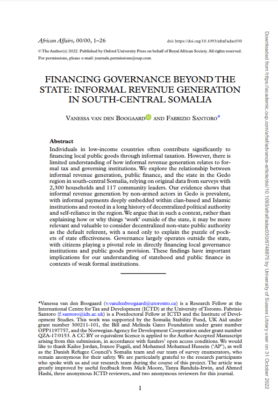African Affairs 00/00, 1-26
Individuals in low-income countries often contribute significantly to financing local public goods through informal taxation. However, there is limited understanding of how informal revenue generation relates to formal tax and governing institutions. We explore the relationship between informal revenue generation, public finance, and the state in the Gedo region in south-central Somalia, relying on original data from surveys with 2,300 households and 117 community leaders. Our evidence shows that informal revenue generation by non-armed actors in Gedo is prevalent, with informal payments deeply embedded within clan-based and Islamic institutions and rooted in a long history of decentralized political authority and self-reliance in the region. We argue that in such a context, rather than explaining how or why things ‘work’ outside of the state, it may be more relevant and valuable to consider decentralized non-state public authority as the default referent, with a need only to explain the puzzle of pockets of state effectiveness. Governance largely operates outside the state, with citizens playing a pivotal role in directly financing local governance institutions and public goods provision. These findings have important implications for our understanding of statehood and public finance in contexts of weak formal institutions.
